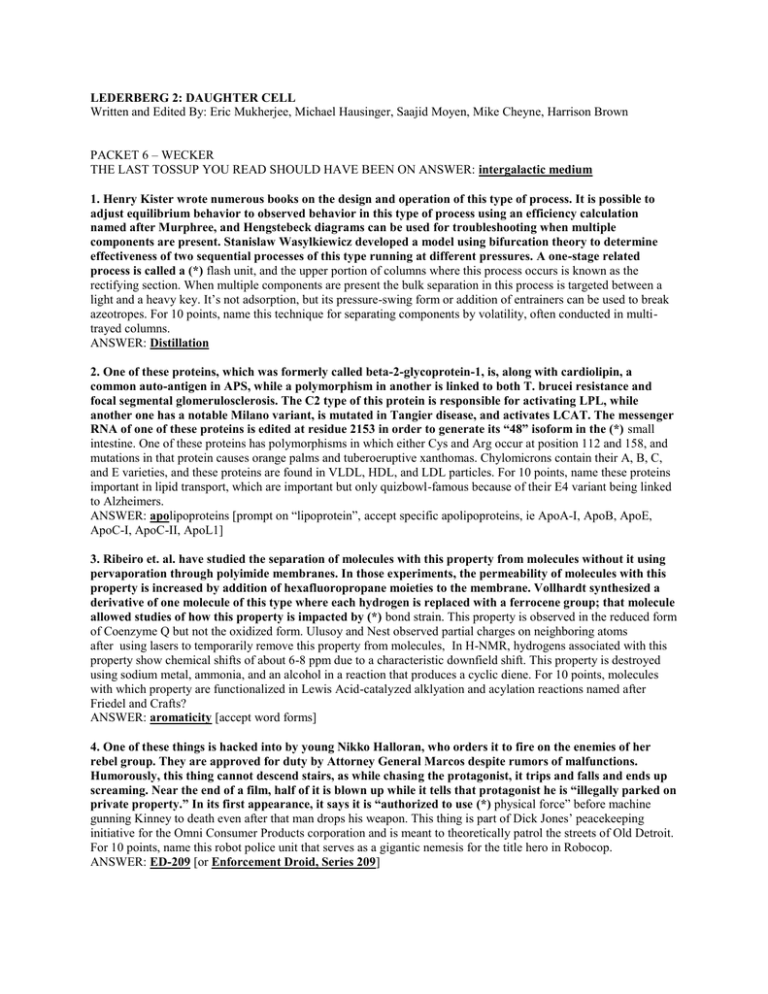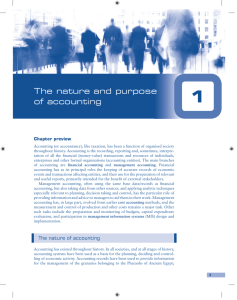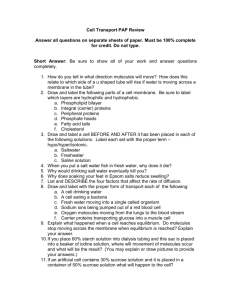WECKER - Collegiate Quizbowl Packet Archive
advertisement

LEDERBERG 2: DAUGHTER CELL Written and Edited By: Eric Mukherjee, Michael Hausinger, Saajid Moyen, Mike Cheyne, Harrison Brown PACKET 6 – WECKER THE LAST TOSSUP YOU READ SHOULD HAVE BEEN ON ANSWER: intergalactic medium 1. Henry Kister wrote numerous books on the design and operation of this type of process. It is possible to adjust equilibrium behavior to observed behavior in this type of process using an efficiency calculation named after Murphree, and Hengstebeck diagrams can be used for troubleshooting when multiple components are present. Stanislaw Wasylkiewicz developed a model using bifurcation theory to determine effectiveness of two sequential processes of this type running at different pressures. A one-stage related process is called a (*) flash unit, and the upper portion of columns where this process occurs is known as the rectifying section. When multiple components are present the bulk separation in this process is targeted between a light and a heavy key. It’s not adsorption, but its pressure-swing form or addition of entrainers can be used to break azeotropes. For 10 points, name this technique for separating components by volatility, often conducted in multitrayed columns. ANSWER: Distillation 2. One of these proteins, which was formerly called beta-2-glycoprotein-1, is, along with cardiolipin, a common auto-antigen in APS, while a polymorphism in another is linked to both T. brucei resistance and focal segmental glomerulosclerosis. The C2 type of this protein is responsible for activating LPL, while another one has a notable Milano variant, is mutated in Tangier disease, and activates LCAT. The messenger RNA of one of these proteins is edited at residue 2153 in order to generate its “48” isoform in the (*) small intestine. One of these proteins has polymorphisms in which either Cys and Arg occur at position 112 and 158, and mutations in that protein causes orange palms and tuberoeruptive xanthomas. Chylomicrons contain their A, B, C, and E varieties, and these proteins are found in VLDL, HDL, and LDL particles. For 10 points, name these proteins important in lipid transport, which are important but only quizbowl-famous because of their E4 variant being linked to Alzheimers. ANSWER: apolipoproteins [prompt on “lipoprotein”, accept specific apolipoproteins, ie ApoA-I, ApoB, ApoE, ApoC-I, ApoC-II, ApoL1] 3. Ribeiro et. al. have studied the separation of molecules with this property from molecules without it using pervaporation through polyimide membranes. In those experiments, the permeability of molecules with this property is increased by addition of hexafluoropropane moieties to the membrane. Vollhardt synthesized a derivative of one molecule of this type where each hydrogen is replaced with a ferrocene group; that molecule allowed studies of how this property is impacted by (*) bond strain. This property is observed in the reduced form of Coenzyme Q but not the oxidized form. Ulusoy and Nest observed partial charges on neighboring atoms after using lasers to temporarily remove this property from molecules, In H-NMR, hydrogens associated with this property show chemical shifts of about 6-8 ppm due to a characteristic downfield shift. This property is destroyed using sodium metal, ammonia, and an alcohol in a reaction that produces a cyclic diene. For 10 points, molecules with which property are functionalized in Lewis Acid-catalyzed alklyation and acylation reactions named after Friedel and Crafts? ANSWER: aromaticity [accept word forms] 4. One of these things is hacked into by young Nikko Halloran, who orders it to fire on the enemies of her rebel group. They are approved for duty by Attorney General Marcos despite rumors of malfunctions. Humorously, this thing cannot descend stairs, as while chasing the protagonist, it trips and falls and ends up screaming. Near the end of a film, half of it is blown up while it tells that protagonist he is “illegally parked on private property.” In its first appearance, it says it is “authorized to use (*) physical force” before machine gunning Kinney to death even after that man drops his weapon. This thing is part of Dick Jones’ peacekeeping initiative for the Omni Consumer Products corporation and is meant to theoretically patrol the streets of Old Detroit. For 10 points, name this robot police unit that serves as a gigantic nemesis for the title hero in Robocop. ANSWER: ED-209 [or Enforcement Droid, Series 209] 5. One enzyme that catalyzes this process is strongly inhibited by phosphorylation at serine 640. This process is promoted by the dissociation of protein phosphatase 1 from a complex, which allows it to remove a phosphate group from the main enzyme in this process. A kinase named for the fact that it regulates an enzyme in this process is bound to Axin, CK1, APC and phosphorylates beta-catenin in the absence of Wnt signaling. This process uses the hydroxyl group on tyrosine-194 of a certain protein as a primer, upon which UDP-conjugated substrates are added. This process creates both alpha-(*)1-4 linkages and alpha-1,6 linkages, the latter through the branching enzyme. This process is promoted in hepatocytes after a meal by insulin. For 10 points, name this process by which glucose is combined into a polymer sometimes called animal starch. ANSWER: glycogen synthesis or glycogenesis [accept common language equivalents like “making glycogen”] 6. Carl Rouse modified this equation for high densities. Rewriting this equation in terms of photon number density is used as a first approximation to derive the redshift and temperature at recombination. This equation is used to describe the dropoff in intensity of the Balmer line above 9900 Kelvin, and in calculating intensity of spectral lines this equation is combined with the Boltzmann equation. This equation is derived by finding the number of states available between two infinitesimally separated (*) momentum states in a system with local thermodynamic equilibrium and ends by finding a ratio of partition functions. This equation was notably repeatedly applied by Cecilia Payne-Gaposchkin to relate temperature to spectral class. The free electron density is found on one side of this equation, which applies in systems with a large Debye length. For 10 points, name this equation derived by an Indian astrophysicist that gives the relative number of atoms in two different ionization states in a plasma. ANSWER: Saha ionization equation 7. The octatetraynyl radical was detected from a structure found in this constellation, and HE Matthews detected tricarbon monoxide from this constellation. The Barnhard 211 and 213 tendrils of gas are anchored to one of this constellation’s namesake molecular clouds. The Crystal Nebula is found in this constellation, and it names an annual meteor shower originating from the comet Encke. Flares in FU Orionis stars are believed to be caused by mass transfer from a type of star named for this constellation. An active region of star formation is a complex named for this constellation and (*) Auriga. The epsilon star in this constellation is the prototype for a type of contracting variable star that is the endpoint of collapse of a molecular cloud through the protostar stage. For 10 points, name this constellation that includes the red giant Aldebaran, the Pleiades, and the Crab nebula, a constellation in the shape of a bull. ANSWER: Taurus 8. Patriat and Courtillot used magnetic anomalies to posit that some of these entities can oscillate between two states, and one such oscillating one is named for Bouvet. One signature of these entities is either anomalous composition of, or gaps in, arc magmatism. An extinct one of these in the North Sea is marked by the Rattray volcanic formation. Derek York extended the theory of these things’ stability to account for relative velocities, and McKenzie and Morgan listed sixteen different types of these entities and found fourteen of them to be (*) stable. One of these sites named for the Galapagos islands is unusual because it contains two additional “micro” constituents, and the Afar depression is caused by the motion of another one of these. The constituents of these entities are labelled either R, T, or F, and the most common type of these is the RRR or ridge-ridge-ridge type. For 10 points, name these areas where three plate boundaries converge at a single point. ANSWER: Triple junctions 9. One phenomenon predicted by this theory was a leptonic muon antineutrino-electron scattering event detected in the Gargamelle bubble chamber. One parameter predicted by this theory has a sine-squared value of 0.23, and this theory predicts the behavior of the universe in a namesake epoch with energy greater than 100 GeV. Another prediction of this theory was confirmed by the UA1 experiment, which used stochastic cooling and won Carlo Rubbia and Simon (*) van der Meer the Nobel. Veltman and t’Hooft showed that this theory was renormalizable, and this theory predicts the existence of neutral currents. The Higgs mechanism is responsible for breaking this theory’s SU(2) x U(1) gauge symmetry, which causes three of the four vector bosons it posits to acquire a positive mass; those three massive particles are the W-plus, W-minus, and Z. Originally posited by Glashow, Weinberg, and Salam, for 10 points, name this theory which unifies two of the four fundamental forces. ANSWER: electroweak [accept Glashow-Weinberg-Salam theory until mention] 10. “Guarantee” and “noise” thresholds can be used in an algorithm for doing this task that the inventors called “winnowing.” That algorithm builds on an earlier algorithm for doing this task that uses a randomly selected fingerprint function and efficiently generalizes to multidimensional rectangular arrays. One algorithm for this task has a worst case running time of O(mn) [“big-Oh of m n”] like the naïve solution but in practice performs very well, especially on multiple targets, because it uses (*) hashing as an approximation test for equality. Common algorithms for doing this task do some preprocessing work, like the computation of a prefix function in the KMP algorithm. This task is also done by the Rabin-Karp algorithm and is often used to detect plagiarism. For 10 points, name this task of looking through text for a specific sequence of characters. ANSWER: string searching [or string matching or pattern matching; accept word forms; prompt on partial answers] 11. Yoneda and Horiuchi’s work on this non-IR technique led to its total reflection variant, which allows for increased sensitivity and less scattering, and Rindby et al. developed capillary focusing for this technique. This technique is often used to measure the sulfur content of oil. Lithium-drifted silicon detectors are often used in energy-dispersive instruments for this technique, while wavelength dispersive instruments use flow counter and scintillation detectors. A helium purge can be used to increase the resolution of this technique, and the effectiveness of this technique is limited by the (*) Auger effect when analyzing light elements. It is often used to determine the elemental composition of rocks and to measure precious metals content, and the response to this technique for a given element is predicted by Moseley’s Law. For 10 points, name this nondestructive form of spectroscopy in which elements are detected through their emission of high-energy photons as electrons change energy levels. Answer: X-Ray Fluorescence [or XRF Spectroscopy or Spectrometry. Do not accept or prompt on “X-ray photoelectron spectroscopy” or “XPS.”] 12. The results of one form of this technique are commonly analyzed using Melanie or REDFIN. One reagent used in this technique is a sulfonated triphenylmethane derivative that is also used in the Bradford assay, though increased sensitivity can be obtained using silver instead. Ammonium persulfate and TEMED are used as polymerizing agents to create the matrix for this technique, which commonly has a separating component underneath a stacking component. A two-dimensional variation of this technique uses a pH (*) gradient to first separate analytes by isoelectric point. This technique uses a Tris-glycine buffer system named for Laemelli. Native variations of this technique don’t use anionic detergents, and the results of this technique are commonly visualized using Coomassie blue. Samples in this technique are commonly boiled in DTT or betamercaptoethanol. The results of this technique are sandwiched between two pieces of filter paper and a piece of PVDF membrane in the transfer step of a western blot. For 10 points, name this technique that uses a polyacrylamide matrix to separate proteins. ANSWER: PAGE [or polyacrylamide gel electrophoresis, or protein gel electrophoresis; or protein electrophoresis accept more specific answers like SDS-PAGE, native PAGE, QNPC-PAGE, 2D SDS-PAGE, etc; need both protein and electrophoresis for points to distinguish from DNA gel electrophoresis; prompt on partial answers] 13. Solutions to this equation can be found by using the Feynman checkerboard formalism. One mathematical device used to write this equation has commutators equal to two times the metric tensor times the identity matrix; those mathematical devices used to solve this equation can be used to generate the C-Lsub-one-comma-three-R Clifford algebra and a series of namesake bilinear covariants. The plane-wave solutions to this equation have eigenvalues of magnitude equal to the square root of quantity m-squared c to the fourth plus c-squared p-squared. In its covariant form, this equation can be written in terms of its namesake (*) gamma matrices, and it can also be written in terms of a pair of matrices alpha and beta, the latter of which is multiplied by m c squared. When applied to a radial potential, this equation predicts a slight difference between the 2-S-one-half and 2-P-one-half orbitals of the hydrogen atom called the Lamb shift. Its originator developed “hole theory” to explain its negative-energy eigenstates. This equation only applies to spin one-half particles. For 10 points, name this relativistic generalization of the Schrodinger equation used to predict the existence of the positron. ANSWER: Dirac equation [do NOT accept “Fermi-Dirac”] 14. Numerical computations of this function often make use of the Lanczos approximation. Holder's theorem states that this function does not satisfy any algebraic differential equation with rational function coefficients. Its characterization as the unique meromorphic function which is log-convex and obeys certain functional equations is due to Bohr and Mollerup. It's not sine, but this function appears in the functional equation for the Riemann zeta function. For real arguments, it can be defined using the Euler integral of the second kind. This function has poles at all (*) nonpositive integers, but is analytic everywhere else. This function, which for some numbers is equal to the integral from 0 to infinity of x to the t minus 1 times e to the x dx. In the right halfplane, Stirling's formula provides a quick approximation to this function. For 10 points, name this function which extends the factorial function to the complex plane. ANSWER: gamma function 15. Very fast open source tools of this type include Open64 and MLton. The Glasgow Haskell one of these and GNAT are examples of these tools that use LLVM. These tools sometimes make use of the Sethi-Ullman algorithm to deal with abstract syntax trees, and they must often employ name-mangling, also known as name decoration. Scripting (*) languages generally do not include these tools. However, when python coders are tired of running directly from the “dot py” file, they can use tools like PyPy to do this rather than using an interpreter; that example of one of these tools operates at run time which earns it the designation “just in time.” For 10 points, name these tools that convert source code into executables. ANSWER: compilers [or word forms] 16. Inhibitors of ROCK kinase are commonly used when culturing these cells after single-cell dissociation. In maintenance of these cells, a group of polycomb proteins like EZH2, SUZ12, and EED are responsible for methylated H3K27 and repressing transcription. The SSEA-1 surface marker is commonly used in flowcytometric analyses of these cells. One marker for these cells is a protein containing both a POU sequence and a homeodomain, which is capable of inducing expression of Rex1. These cells are commonly cultured in the presence of Leukemia Inhibitory Factor, which induces the overexpression of (*) NANOG. These cells form three-dimensional cylindrical bodies in some culture conditions. Oct4, Sox2, and Klf2 are also markers of these cells, which can be created by somatic cell nuclear transfer. The easiest way to acquire these cells is through the inner cell mass of a blastocyst. For 10 points, name this type of cell capable of developing into any tissue in the body. ANSWER: embryonic stem cells [or ESCs or induced pluripotent stem cells or iPS cells; prompt on “stem cells”] 17. The number density of these objects at a particular mass is calculated by the excursion set method, which is a modification of the Press-Schechter formalism. That method is in turn used to create merger trees of these. Methods of finding these entities in simulations include the Friends-of-Friends algorithm and the bound-density maximum method. The masses of these entities can be estimated from stellar luminosity in a type of abundance matching named for these entities. One problem in the modelling of these objects is that simulations of them show high density at the center; that problem calls these entities “cuspy”. The mass distribution of these entities can be estimated via the exponential Einasto profile and the (*) NFW profile. These entities serve as seed points for baryonic matter and are thus the building blocks of hierarchical structure formation. MACHOs are named for the fact that they exist in these regions, and these regions were hypothesized after Rubin found that rotation curves aren’t Keplerian. For 10 points, name these spherical regions surrounding galaxies that are filled with dark matter. ANSWER: dark matter halo [prompt on “galaxies” or “galaxy seeds”] 18. Banks of these devices made of diamonds are commonly found in add-drop multiplexers, and an extremely asymmetric form of these devices is named for Gilles and Tournais. The ratio of c to 2 n l cosine theta gives the free spectral range of one of these devices, and the full width at half maximum for one of these devices can be approximated by taking four over the square root of the coefficient of finesse. The center of these devices contain either two slightly wedge-shaped (*) plates whose separation can be varied, or a single plate with two reflective surfaces called an etalon, which is flanked by collimating and focusing lenses, creating multiple reflections. A common application of these devices is observing the Zeeman effect in mercury or selecting a single spectral line from the sun, as these devices can be used to separate two rays with similar wavelength. For 10 points, name this type of interferometer named for two French physicists. ANSWER: Fabry-Perot interferometer [prompt on “interferometer”; accept etalon before mention] 19. In snow formations, this phenomenon is responsible for producing gastrugi, and sudden examples of this phenomena include the squamish and the willawaw. The power density of this phenomenon is rated by it’s NREL class, and the relationship between height and the intensity of this phenomenon depends on the Hellman exponent. One type of this phenomenon is caused by a difference in adiabatic lapse rates on the two sides of a (*) mountain and is called Foehn, and those under the influence of gravity that carries high-density constituents is called katabatic. The slip face of barchans get their shape from facing this phenomenon, which is also responsible for transporting sand grains by saltation and building sand dunes. For 10 points, name this physical phenomena that is responsible for Aeolian processes like erosion. ANSWER: wind [accept answers like air currents] 20. A developmental biodiesel production process operated under these conditions avoids the use of a catalyst, allowing a wider selection of feedstocks and avoiding saponification. Aluminum oxide aerogels are dried under these conditions, and the SEDS process can be used to control pharmaceutical crystallization under these conditions. A chromatographic technique conducted under these conditions is useful for analyzing large hydrophobic molecules and can be used to separate chiral molecules; that technique uses the same columns as (*) HPLC. In food processing, carbon dioxide under these conditions is often used to decaffeinate coffee. Materials under these conditions have high densities, low viscosities, and no surface tension. For 10 points, name this type of high-temperature, high-pressure condition where distinct liquid and gas phases do not exist. ANSWER: supercritical fluid [prompt on high pressure or high temperature or both; accept answers saying something about being above the critical point]





